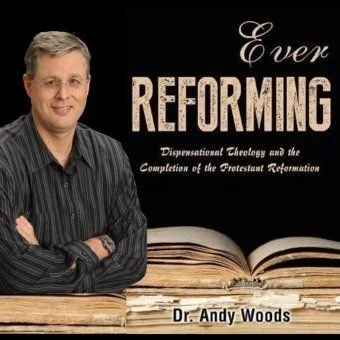Book of the Month - October 2025
Ever Reforming
Andy Woods - ISBN: 978-1945774195 - 2018
Author:
Dr. Andy Woods
Andrew Marshall Woods, JD, ThM, PhD, came to faith in Christ at the age of sixteen. He graduated with high honors from the University of Redlands in California, earning baccalaureate degrees in both Business Administration and Political Science. He went on to obtain a Juris Doctorate from Whittier Law School, practiced law, and taught Business, Law, and related courses at Citrus Community College in California. From 1996 to 1998, he also served as Interim Pastor of Rivera First Baptist Church in Pico Rivera, California.
In 1998, Dr. Woods began theological studies at Chafer and Talbot Theological Seminaries before completing both a Master of Theology degree with high honors (2002) and a Doctor of Philosophy in Bible Exposition (2009) at Dallas Theological Seminary. He was twice awarded the Donald K. Campbell Award for Excellence in Bible Exposition (2005, 2009). Formerly a professor of Bible and theology at the College of Biblical Studies in Houston (2009–2016), he now serves as president of Chafer Theological Seminary and senior pastor of Sugar Land Bible Church. Married to his wife, Anne, for over twenty-three years, they have a daughter named Sarah. Dr. Woods has contributed to numerous theological journals and Christian books and regularly speaks at Christian conferences on a wide range of biblical topics.
Taken from AndyWoodsMinistries.org
Brief Synopsis:
People tend to place the Reformers on a pedestal and act like they completed the revolution, but they did not. Why was the Protestant Reformation only a partial restoration? It was because they used the literal method of interpreting the Bible selectively.
Ever Reforming will guide the reader to understand all that needed to be reformed, how the Reformers started the process, and the way in which that led to Dispensational Theology and the full recovery of the literal method of interpreting God's Word.
Insights:
“The interesting thing about manmade traditions is that they frequently depart from God’s Word. Thus, when they departed from God’s written Word, Luther (like Jesus) departed from them.”
“The better you understand the 66 books of the Bible, the more you will recognize false teaching when it crosses your path. In the Middle Ages, people had no such ability, as they did not have access to the truth.”
“Now here is the point: Alexandrian and Augustinian thinking would never have taken over the church if the composition of the church had remained Jewish. That is because Jews are steeped in the Old Testament from birth, and they interpret it literally. They would never have accepted the doctrine of amillennialism.”
Should I read it or skip it?
Andy Woods’s Ever Reforming is a great contribution to theology—one that invites readers to consider how the Reformation remains an ongoing journey, not just a historical milestone.
From the opening pages, Dr. Woods challenges the notion that the Protestant Reformation is a finished revolution, arguing that its reliance on literal interpretation of Scripture was, in some respects, partial and selective. He takes us on a tour of history—tracing early church interpretive methods from Antioch to Alexandria and highlighting how allegorical approaches drifted the church away from a grounded hermeneutic. This concept provided me with a way to connect dispensationalism from the first century to today. Often, people will jetison dispensationalism because it has only been around a few hundred years. However, given that the early church fathers, like Augustine, jettisoned literal interpretation in favor of allegory, I could wrap my head around how and why it took so long to take hold in theology.
One of the book’s greatest strengths is the way Dr. Woods reframes Dispensationalism—not as a fringe or novel idea, but as a faithful heir to the Reformers’ own hermeneutical convictions. He shows that the same commitment to a consistent, plain-sense reading of Scripture that restored the gospel to its biblical roots during the Reformation naturally extends to all of God’s Word, including the prophetic passages. In doing so, Dr. Woods makes the case that Dispensationalism is not an addition to the Reformers’ work but its logical continuation—a determination to let the text speak on its own terms from Genesis to Revelation, without selectively abandoning literal interpretation when the subject turns to Israel’s future or Christ’s return. This approach not only defends the integrity of biblical prophecy but also affirms God’s unchanging faithfulness to His promises.
Overall, Ever Reforming is an important book that reframes Dispensationalism as a natural progression of the Reformers’ hermeneutic legacy. It’s a book I expect to revisit and have already bought a couple of copies for others to read with me. You shouldn’t skip it.

